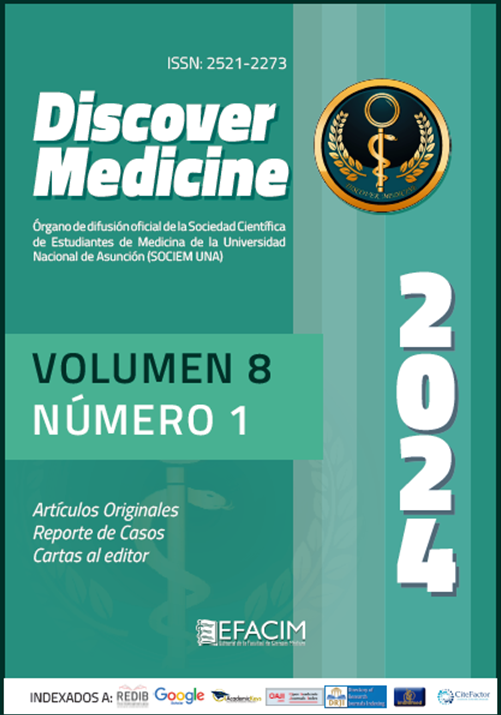Abstract
Background: Self-medication is perceived as a convenient and quick way to manage minor health problems, especially in socie- ties where access to medical care may be limited or costs. This practice carries risks, including inappropriate use of medicines, lack of proper diagnosis, negative drug-drug interactions, and the potential development of antimicrobial resistance. Objective: To determine the knowledge of risks and perception of benefits of self-medication in the adult population of Paraguay. Methodology: Observational, descriptive and prospective study, carried out in Paraguay during February of the year 2024. Non-probabilistic convenience sampling was used, selecting participants who were available to complete the online survey. The survey allowed the identification of socio-demographic va- riables, knowledge of risks and perception of benefits. Data were analysed using descriptive statistical techniques.
Results: The study included 127 participants, with an average age of 47.39 years, 79.5% of participants were female, most par- ticipants had attained secondary education (37.8%). In terms of risk awareness, 44.9% of participants recognised the risk of mis- diagnosis. In terms of perceived benefits, 40.9% of participants considered prior knowledge of effective therapies to be a signi- ficant benefit.
Conclusions: Self-medication is a common practice among the adult population in Paraguay, driven by convenience and distrust of the health system, and based mainly on information from non-professional sources. Although there is significant knowle- dge about the associated risks, the perception of immediate be- nefits continues to motivate this practice.
References
Baracaldo-Santamaría D, Trujillo-Moreno MJ, Pérez-Acosta AM, Feliciano-Alfonso JE, Calde- ron-Ospina CA, Soler F. Definition of self-medication: a scoping review. Ther Adv Drug Saf. 1 de enero de 2022;13:20420986221127501.
Mok CZ, Sellappans R, Ee Loo JS. The pre- valence and perception of self-medication among adults in the Klang Valley, Malaysia. Int J Pharm Pract. 1 de febrero de 2021;29(1):29-36.
Bisher MA, Alsagoor NAN, Alqureshah HMZ, Hutaylah MMA, Komssan MSYA, Almansour (6) MSS, et al. Impact of Self-medications and Medications Misuse on Health Outcomes. Adv Clin Exp Med [Internet]. 26 de diciembre de 2022 [citado 15 de junio de 2024];9(4). Disponible en: https:/journal.yemdd. org/index.php/acamj/article/view/83
Ghodkhande KP, Choudhari SG, Gaidhane A. Self-Medication Practices Among the Geriatric Po- pulation: A Systematic Literature Review. Cureus. 15(7):e42282.
Gauld NJ, Baumgärtel CA, Buetow SA. Why are self-medication opportunities limited in Austria? An interview study and comparison with other countries. PLOS ONE. 25 de enero de 2021;16(1):e0245504.
Teixeira K de H, Barbosa A de L de O, Santana AL, Silva DIS, Santos RVC dos, Souza VCGB de, et al. Self-medication: a study on motivational factors and consequences of this practice. Res Soc Dev. 28 de ju- nio de 2020;9(8):e161985608-e161985608.
Oleszkiewicz P, Krysinski J, Religioni U, Mer- ks P. Access to Medicines via Non-Pharmacy Outlets in European Countries—A Review of Regulations and the Influence on the Self-Medication Phenome- non. Healthcare. febrero de 2021;9(2):123.
Ansari M, Alanazi A, Moin A. Consumers’ awareness, attitude and associated factors towards self-medication in Hail, Saudi Arabia. PLOS ONE. 28 de abril de 2020;15(4):e0232322.
Yasmin F, Asghar MS, Naeem U, Najeeb H, Nauman H, Ahsan MN, et al. Self-Medication Practi- ces in Medical Students During the COVID-19 Pande- mic: A Cross-Sectional Analysis. Front Public Health [Internet]. 9 de marzo de 2022 [citado 15 de junio de 2024];10. Disponible en: https:/www.frontiersin. org/journals/public-health/articles/10.3389/fpu- bh.2022.803937/full
Alduraibi RK, Altowayan WM. A cross-sec- tional survey: knowledge, attitudes, and practi- ces of self-medication in medical and pharmacy students. BMC Health Serv Res. 17 de marzo de 2022;22(1):352.
Alves RF, Precioso J, Becoña E. Knowled- ge, attitudes and practice of self-medication among university students in Portugal: A cross-sectional study. Nord Stud Alcohol Drugs. 1 de febrero de 2021;38(1):50-65.
Janatolmakan M, Abdi A, Andayeshgar B, Soroush A, Khatony A. The Reasons for Self-Me- dication from the Perspective of Iranian Nursing Students: A Qualitative Study. Nurs Res Pract. 2022;2022(1):2960768.
Sigcho LGC, Hurtado WAJ. Factors that in- fluence the practice of self-medication in adoles- cents. Sapienza Int J Interdiscip Stud. 6 de julio de 2023;4(SI1):e23031-e23031.
Okoye OC, Adejumo OA, Opadeyi AO, Madu- buko CR, Ntaji M, Okonkwo KC, et al. Self medication practices and its determinants in health care profes- sionals during the coronavirus disease-2019 pande- mic: cross-sectional study. Int J Clin Pharm. 1 de abril de 2022;44(2):507-16.
Tohan MM, Ahmed F, Juie IJ, Kabir A, Howla- der MH, Rahman MA. Knowledge attitude and conve- nience on self-medication practices among university students in Bangladesh exploration using structural equation modeling approach. Sci Rep. 12 de mayo de 2024;14(1):10837.
Al-Worafi YM. Self-medication. En: Al-Wo- rafi Y, editor. Drug Safety in Developing Coun- tries [Internet]. Academic Press; 2020 [citado 15 de junio de 2024]. p. 73-86. Disponible en: ht- tps:/www.sciencedirect.com/science/article/pii/ B9780128198377000078
Atkinson AM, van de Ven K, Cunningham M, de Zeeuw T, Hibbert E, Forlini C, et al. Performance and image enhancing drug interventions aimed at increasing knowledge among healthcare professio- nals (HCP): reflections on the implementation of the Dopinglinkki e-module in Europe and Australia in the HCP workforce. Int J Drug Policy. 1 de septiembre de 2021;95:103141.
Peña M, Amarilla JFA, Ortola MJ, Cardozo M, Morínigo M, Moura A, et al. Tratamiento psicofarmacológico y factores sociodemográficos de estudiantes universitarios del Paraguay, 2022. Discov Med [Internet]. 2022 [citado 15 de junio de 2024];6(2). Disponible en: https:/revistascientificas.una.py/in- dex.php/DM/article/view/3623

This work is licensed under a Creative Commons Attribution-NonCommercial-NoDerivatives 4.0 International License.
Copyright (c) 2024 Myrian Aidet Colmán Gómez, Micaela Yanina Pintos Müller, Diego Ariel Velazquez Villasanti, Carmen Noemí Burgos Espinola
